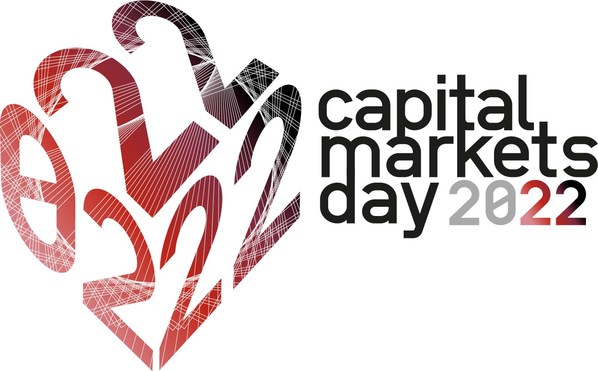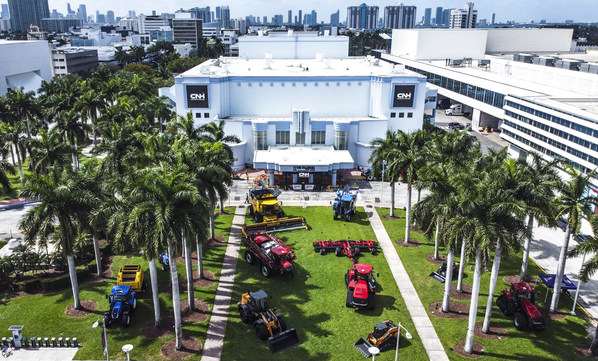战略重点以客户启发的创新、技术领导地位、品牌和经销商实力、卓越运营以及可持续治理为中心
发布公司宗旨:Breaking New Ground(开辟新天地)创新可持续生产力
新可持续目标,包括坚定支持科学碳目标倡议(SBTi)
发布三年财务目标,包括:
2024年工业活动净收入增至200-220亿美元,年复合增长率~6%
2022 -2024年工业活动累计自由现金流预计超过44亿美元
凯斯纽荷兰工业集团今日在美国佛罗里达迈阿密举办资本市场日活动,发布公司2024年新战略规划。

凯斯纽荷兰工业集团2022年资本市场日活动

凯斯纽荷兰工业集团2022年资本市场日
凯斯纽荷兰工业集团首席执行官ScottW. Wine介绍了分拆后的新凯斯纽荷兰工业集团,以及公司的战略发展重点,包括客户启发的创新;技术领导地位; 品牌和经销商实力;卓越 运营 以及可持续治理 。
公司领导班子的其他成员分别介绍了精准技术、农业机械与工程机械、电气化与替代能源、可持续发展以及三年财务目标方面的内容。
“今天,我和同事们很荣幸可以向大家介绍新的凯斯纽荷兰工业集团,以及公司为加快客户启发的增长,提高财务表现而制定的长期发展战略。我们有信心今天在这里阐述的战略规划将会为公司未来发展打下坚实的基础,让我们秉承宗旨,稳步向前。”凯斯纽荷兰工业集团首席执行官Scott W. Wine说到。“我们将充分发挥自身的竞争力以及购入资产的优势,提升农业机械和工程机械业务的能力。公司经验丰富的团队将怀抱共同的目标,大胆进取,为所有利益相关方谋求更多利益。战略规划中每一步都以客户为导向,将促使凯斯纽荷兰工业集团为全球农户和工程机械专业人员提供具备领先技术的国际一流产品。”
Breaking New Ground 开辟新天地 - 创新 可持续 生产力
公司新宗旨为新2024战略规划提供了重要支撑。新宗旨Breaking New Ground开辟新天地体现了凯斯纽荷兰工业集团锐意前行,永立潮头,持续寻求更好的解决方案和突破性想法。新公司宗旨围绕创新,可持续和生产力,加速提升凯斯纽荷兰工业集团的能力,帮助全球农业和工程行业应对巨大挑战,解决不断增长的人口带来的粮食和居住的问题。
严谨的财务战略
首席财务官Oddone Incisa介绍了公司新2024财务战略。公司将通过严谨的投资,继续实现有机增长,同时追求无机增长机会,以增强能力,加快盈利增长。新成立了凯斯纽荷兰工业集团投资公司,负责推进现有合作伙伴关系,并继续开拓与农业和工程行业的数字和技术初创企业的合作。规划期内资本性支出将会增加,以加速有机增长,提升客户体验,为可持续的未来发展奠定基础。
凯斯纽荷兰工业集团将坚持一个强健的资产负债表、强流动性,并且维持公司的投资信用评级。公司确认2023年净负债为零的目标。财务战略的其他要点包括:
2024年毛利率超过24%,在规划期内增长300基点
研发投入~26亿美元,增加至净销售收入的~4.5%,主要用于新产品和新精准技术开发。
新2024财务规划还将贯彻分红政策,并确认公司有能力实施合理回购。
精准技术:瞄准数字领导地位
公司新战略的核心在于对自动化技术的领导地位的关注,以及坚定实现完全无人农业循环,同时将这一技术延伸到工程机械领域,提升工程机械的竞争力。
首席数字官Parag Garg阐述了公司如何赋能提升农业生产力和增加产出。利用购入的Raven的先进的精准技术,并倡导即插即用的自动化和无人化解决方案以及一系列的数字服务,公司正在加快交付智能设备,帮助客户解决挑战,更轻松应对工作。Raven工业显著增强了凯斯纽荷兰工业集团的能力,使其得以迅捷地升级产品解决方案至行业最佳,满足不断升级的客户需求。
公司精准技术战略有以下支柱为上述工作提供支撑:
客户至上,高度关注客户需求,并据此设计技术解决方案
技术文化,采用精益且符合潮流的工作方式,实现最优执行
技术栈,灵活强大的技术基础设施,以推进自动化和无人驾驶;以及
一个健康有益的合作伙伴生态系统,培养开放的协作,并扫除障碍
农业机械事业部: 行业领先的产品( Great Iron )以及尖端技术( Great Tech )
农业机械事业部总裁Derek Neilson介绍了公司农业机械事业部规划。公司通过为客户量身定制的品牌,产品和经销网络,供应全线农业装备,业务遍及约200个国家。在规划期内,研发投入和资本性支出计划将几乎倍增至40亿美元,专注用于开发以客户为中心的创新,包括自动化、无人驾驶、设备互联生态系统以及可替代能源领域。农业机械利润率2024年预计达到14.5- 15.5%。
凯斯纽荷兰工业集团将在实现客户和经销商满意的卓越方面进行投资,这对公司未来的成功至关重要。公司将显著扩展其先进的、可以提高生产率的农业机械产品线,规划期内预计将投放150个产品,支持凯斯和纽荷兰农业机械品牌的差异化定位。
工程机械事业部:实现利润
工程机械事业部总裁Stefano Pampalone介绍了工程机械业务的转型如何为未来获利增长打下良好基础。收购Sampierana业务是一个关键赋能要素,可以进一步提升公司的技术能力,拓展中型和中小型挖掘机产品线,包括电动机型。工程机械事业部将会推出面向客户的新解决方案,提高生产率、安全性和可持续性。公司将继续实施多品牌战略,包括凯斯工程机械、纽荷兰工程机械(利用其农业机械经销商网络和应用)以及Eurocomach(新购入的Sampierana公司旗下品牌)。
对电气化 & 替代能源的未来投资
鉴于全球对零排放的要求日益增长,凯斯纽荷兰工业集团将继续增强其在替代能源领域的领导地位(得益于超过15年的研发和产品商用化)。这将使得客户获得更好的经营结果;提高生产率,改善用户体验;开发新的使用场景和应用,与此同时更好地保护环境。
先进技术与创新副总裁Selin Tur介绍了公司的电气化及可替代能源战略。战略的重点体现在强有力的创新协同产品计划,预计横跨农业和工程机械事业部所有产品线。公司将通过战略合作伙伴关系增强现有的能力,并将产品平台培训延伸至自身的供应链体系。
可持续治理
在可持续方面,新凯斯纽荷兰工业集团将继续推进卓越,这是公司长期的发展路径,受到多方重要机构的认可。首席多样与包容,可持续与转型官Kelly Manley介绍了公司的可持续战略,包括:
碳足迹,坚定支持科学碳目标倡议(SBTi),将其作为公司在气候和环境方面的可持续努力的自然延续;
循环利用与生态效益,确保产品生命周期可持续,优化公司的工厂水资源利用和废弃物管理;
包容,平等和参与,公司致力于建设平等的人力资本,实施文化转型,并增进与运营所在社区的良好关系;以及,
治理与承诺,应用更好的指标,来衡量可持续表现。所有这些努力都将致力于继续确保凯斯纽荷兰工业集团在行业的可持续领导地位,提升其作为受青睐的雇主的形象。
“这一战略计划体现了凯斯纽荷兰工业集团正在进行的显著转型。我们生活在一个瞬息万变的世界,行业竞争激烈,但是我对我们的团队和战略充满信心,”凯斯纽荷兰工业集团董事会主席Suzanne Heywood说到。“董事会和我完全赞同今天发布的战略规划,支持公司高层领导团队在客户启发的增长、可持续发展以及不断改善公司文化方面的决心,这一切都将为所有利益相关方创造更大的价值。”
在凯斯纽荷兰工业集团公司网站的资本市场日专区可以查阅今天活动的相关资料。
凯斯纽荷兰工业集团 (NYSE: CNHI /MI:CNHI)是一家世界一流的设备和服务公司。在以创新、可持续和生产力为中心的公司宗旨 -- 开辟新天地的推动下,公司为旗下五个核心品牌提供战略方向、研发能力和投资,促使他们获得成功:其中,凯斯农业机械、纽荷兰农业机械和斯太尔提供360度全方位的农业应用,从设备到农机具再到增强其能力的数字技术,一应俱全;凯斯工程机械和纽荷兰工程机械提供全系工程机械产品,促使行业提升生产力。在跨越两个多世纪的历史中,凯斯纽荷兰工业集团一直是行业先行者,秉承宗旨,满怀热忱地不断坚持创新,推动客户提升效率,收获成功。作为一家名副其实的全球化公司,凯斯纽荷兰工业集团拥有35,000多名员工,形成了多元包容的企业文化,专注于以客户为中心,支持他们发展和建设更美好的世界。
Forward-looking statements
All statements other than statements of historical fact contained in this press release, including competitive strengths; business strategy; future financial position or operating results; budgets; projections with respect to revenue, income, earnings (or loss) per share, capital expenditures, dividends, liquidity, capital structure or other financial items; costs; and plans and objectives of management regarding operations and products, are forward-looking statements. Forward looking statements also include statements regarding the future performance of CNH Industrial and its subsidiaries on a standalone basis. These statements may include terminology such as “may”, “will”, “expect”, “could”, “should”, “intend”, “estimate”, “anticipate”, “believe”, “outlook”, “continue”, “remain”, “on track”, “design”, “target”, “objective”, “goal”, “forecast”, “projection”, “prospects”, “plan”, or similar terminology. Forward-looking statements, including those related to the COVID-19 pandemic, are not guarantees of future performance. Rather, they are based on current views and assumptions and involve known and unknown risks, uncertainties and other factors, many of which are outside our control and are difficult to predict. If any of these risks and uncertainties materialize (or they occur with a degree of severity that the Company is unable to predict) or other assumptions underlying any of the forward-looking statements prove to be incorrect, including any assumptions regarding strategic plans, the actual results or developments may differ materially from any future results or developments expressed or implied by the forward-looking statements. Factors, risks and uncertainties that could cause actual results to differ materially from those contemplated by the forward-looking statements include, among others: the continued uncertainties related to the unknown duration and economic, operational and financial impacts of the global COVID-19 pandemic and the actions taken or contemplated by governmental authorities or others in connection with the pandemic on our business, our employees, customers and suppliers; supply chain disruptions, including delays caused by mandated shutdowns, industry capacity constraints, material availability, and global logistics delays and constraints; disruption caused by business responses to COVID-19, including remote working arrangements, which may create increased vulnerability to cybersecurity or data privacy incidents; our ability to execute business continuity plans as a result of COVID-19; the many interrelated factors that affect consumer confidence and worldwide demand for capital goods and capital goods-related products, including demand uncertainty caused by COVID-19; general economic conditions in each of our markets, including the significant economic uncertainty and volatility caused by COVID-19; travel bans, border closures, other free movement restrictions, and the introduction of social distancing measures in our facilities may affect in the future our ability to operate as well as the ability of our suppliers and distributors to operate; changes in government policies regarding banking, monetary and fiscal policy; legislation, particularly pertaining to capital goods-related issues such as agriculture, the environment, debt relief and subsidy program policies, trade and commerce and infrastructure development; government policies on international trade and investment, including sanctions, import quotas, capital controls and tariffs; volatility in international trade caused by the imposition of tariffs, sanctions, embargoes, and trade wars; actions of competitors in the various industries in which we compete; development and use of new technologies and technological difficulties; the interpretation of, or adoption of new, compliance requirements with respect to engine emissions, safety or other aspects of our products; production difficulties, including capacity and supply constraints and excess inventory levels; labor relations; interest rates and currency exchange rates; inflation and deflation; energy prices; prices for agricultural commodities; housing starts and other construction activity; our ability to obtain financing or to refinance existing debt; price pressure on new and used vehicles; the resolution of pending litigation and investigations on a wide range of topics, including dealer and supplier litigation, follow-on private litigation in various jurisdictions after the settlement of the EU antitrust investigation of the Iveco Group announced onJuly 19, 2016, intellectual property rights disputes, product warranty and defective product claims, and emissions and/or fuel economy regulatory and contractual issues; security breaches, cybersecurity attacks, technology failures, and other disruptions to the information technology infrastructure of CNH Industrial and its suppliers and dealers; security breaches with respect to our products; our pension plans and other post-employment obligations; further developments of the COVID-19 pandemic on our operations, supply chains, distribution network, as well as negative evolutions of the economic and financial conditions at global and regional levels; political and civil unrest; volatility and deterioration of capital and financial markets, including other pandemics, terrorist attacks inEuropeand elsewhere; our ability to realize the anticipated benefits from our business initiatives as part of our strategic plan; our failure to realize, or a delay in realizing, all of the anticipated benefits of our acquisitions, joint ventures, strategic alliances or divestitures and other similar risks and uncertainties, and our success in managing the risks involved in the foregoing.
Forward-looking statements are based upon assumptions relating to the factors described in this earnings release, which are sometimes based upon estimates and data received from third parties. Such estimates and data are often revised. Actual results may differ materially from the forward-looking statements as a result of a number of risks and uncertainties, many of which are outside CNH Industrial’s control. CNH Industrial expressly disclaims any intention or obligation to provide, update or revise any forward-looking statements in this announcement to reflect any change in expectations or any change in events, conditions or circumstances on which these forward-looking statements are based. Further information concerning CNH Industrial, including factors that potentially could materially affect CNH Industrial’s financial results, is included in CNH Industrial’s reports and filings with the U.S. Securities and Exchange Commission (“SEC”), the Autoriteit Financiële Markten (“AFM”) and Commissione Nazionale per le Società e la Borsa (“CONSOB”).
(新媒体责编:pl0902)
声明:
1、凡本网注明“人民交通杂志”/人民交通网,所有自采新闻(含图片),如需授权转载应在授权范围内使用,并注明来源。
2、部分内容转自其他媒体,转载目的在于传递更多信息,并不代表本网赞同其观点和对其真实性负责。
3、如因作品内容、版权和其他问题需要同本网联系的,请在30日内进行。电话:010-67683008
人民交通24小时值班手机:17801261553 商务合作:010-67683008转602 E-mail:zzs@rmjtzz.com
Copyright 人民交通杂志 All Rights Reserved 版权所有 复制必究 百度统计 地址:北京市丰台区南三环东路6号A座四层
增值电信业务经营许可证号:京B2-20201704 本刊法律顾问:北京京师(兰州)律师事务所 李大伟
 京公网安备 11010602130064号 京ICP备18014261号-2 广播电视节目制作经营许可证:(京)字第16597号
京公网安备 11010602130064号 京ICP备18014261号-2 广播电视节目制作经营许可证:(京)字第16597号



